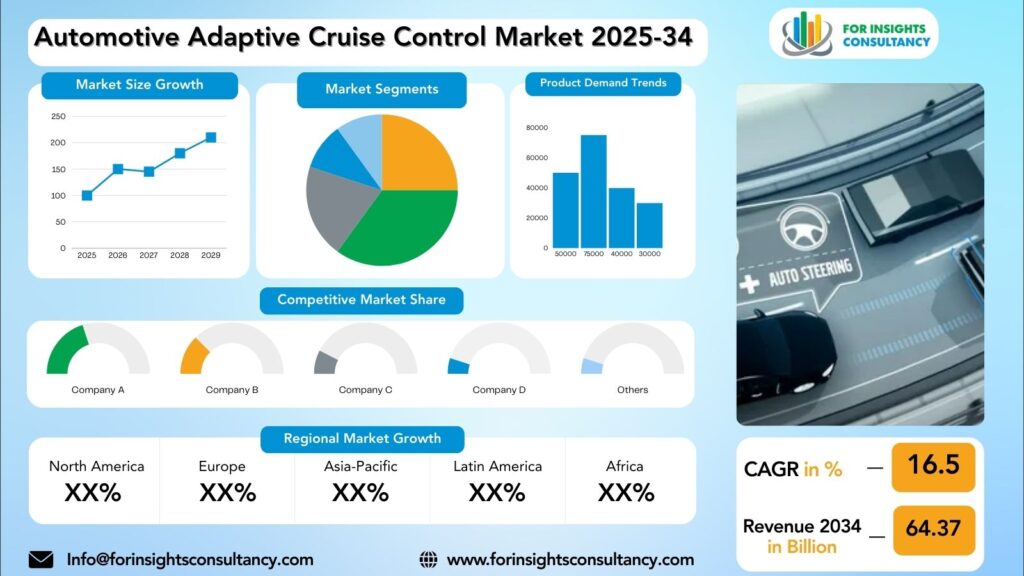
Automotive Adaptive Cruise Control Market Research Report by Vehicle Type (Commercial VehiclesPassenger Cars), by Component (Electronic Control Unit (ECU), Sensors, Actuators, Human-Machine Interface (HMI)), by Technology (LiDAR-Based, RADAR-Based, Camera/Image Sensor-Based, Ultrasonic/Laser Sensor-Based), by End-Use/Sales Channel And Region Global Market Analysis and Forecast, 2025-2034
Aug-2025 Formats | PDF | Category: Automotive | Delivery: 24 to 72 Hours
Automotive Adaptive Cruise Control Market is forecast to increase from USD 23.89 billion in 2025 to USD 64.37 billion by 2034, at a CAGR of 16.5%.
Automotive Adaptive Cruise Control Market: A Comprehensive Overviewand Future Developments
The Automotive Adaptive Cruise Control (ACC) market is a rapidly growing area driven by consumer demand for safety and convenience. Automotive Adaptive Cruise Control is a driver assistance system that automatically adjusts the vehicle’s speed to maintain a safe distance from the vehicle in front. This innovative technology has gained popularity for its ability to enhance driving comfort and safety.
The future of Automotive Adaptive Cruise Control technology is promising, with manufacturers working on integrating artificial intelligence and machine learning algorithms to improve accuracy and performance. This will enable vehicles to anticipate traffic patterns, road conditions, and driver behavior more effectively, leading to enhanced safety and efficiency on the road. The development of connected car technology is expected to revolutionize the Automotive Adaptive Cruise Control market, enabling more efficient traffic flow and coordination between vehicles. As the market continues to evolve, manufacturers need to address challenges and seize opportunities to stay ahead in this competitive landscape. Automotive Adaptive Cruise Control is shaping the future of driving, making vehicles smarter, safer, and more efficient than ever before.
Automotive Adaptive Cruise Control Market Dynamics
Growth Drivers
The automotive industry is increasingly prioritizing driver safety, with ACC being a key safety feature that reduces the risk of rear-end collisions. As demand for Advanced Driver Assistance Systems (ADAS) grows, so does the market for ACC technology. The automotive industry is constantly evolving, with new technologies and innovations shaping the driving experience. ACC is one of many advanced features that are revolutionizing the driving experience, attracting tech-savvy consumers and driving market growth. Government regulations and safety standards are becoming more stringent, and ACC not only enhances driver safety but also helps automakers meet these regulations, driving the adoption of this technology in new vehicles. As the automotive industry moves towards autonomous driving, ACC will play a crucial role in enhancing the overall driving experience.
Restraints
The widespread adoption of adaptive cruise control technology is hindered by several factors. The high cost of implementing advanced sensors, radars, and cameras can make it unaffordable for many consumers. Integration is also complex and time-consuming, requiring careful calibration and alignment of sensors and cameras, as well as sophisticated software programs. Adverse weather conditions, such as heavy rain, snow, or fog, can impact sensor accuracy, leading to potential safety risks. Additionally, the automotive industry is still developing standardized protocols and regulations for adaptive cruise control technology, which can create interoperability issues and compatibility challenges, affecting the seamless integration of these systems. These challenges can deter automakers from incorporating this technology into their vehicles.
Opportunity
The Automotive Adaptive Cruise Control (ACC) market is constantly evolving due to technological advancements and the increasing demand for autonomous vehicles. ACC systems, essential for safe navigation, are expected to surge as consumer interest in self-driving cars increases. Emerging markets like Asia-Pacific and Latin America are experiencing rapid vehicle sales, boosting demand for advanced safety features like ACC. Investing in companies at the forefront of these innovations could provide growth opportunities.
Collaborating with leading automotive manufacturers to integrate ACC technology into their vehicles can be a strategic move for companies operating in the ACC market. This can enhance market visibility and reach a broader customer base. By investing in companies at the forefront of these innovations, businesses can capitalize on the growing demand for ACC technology in the market.
Challenges
The automotive adaptive cruise control market faces several challenges, including lack of standardization and interoperability among manufacturers, high implementation costs, reliability and safety concerns, and lack of driver education and awareness. Interoperability issues can lead to compatibility issues between ACC systems, making it difficult for consumers to switch between vehicles without losing functionality. The high cost of implementing ACC technology, including additional sensors, cameras, and radar systems, can make it less attractive to budget-conscious consumers. To make ACC more accessible, automakers need to find ways to reduce costs without compromising quality and performance. Reliability and safety concerns remain, with issues like false alarms, sensor malfunctions, and unpredictable behavior in heavy traffic or adverse weather conditions undermining consumer confidence. Manufacturers need to conduct rigorous testing and validation to ensure the safety and reliability of ACC systems. Additionally, a lack of awareness among drivers about ACC systems can lead to misuse or over-reliance, necessitating investments in driver education programs and campaigns.
Automotive Adaptive Cruise Control Market Top Companies Covered In This Report:
Evaluate The Strategic Positioning And Innovation Pipelines Of Leading Market Companies-From Multinational Enterprises To Disruptive Regional Firms. Understand How Key Players Are Innovating, Expanding, And Capturing Value, And Use Competitive Benchmarks To Plan Your Next Move.
- Aptiv
- ZF Friedrichafen AG
- Mando Corporation
- Denso
- Valeo
- Robert Bosch GmbH
- Continental AG
- Luminar Technologies, Inc
- Velodyne Lidar, Inc
- Magna International
- Autoliv, Inc.
- Nxp Semiconductors
Automotive Adaptive Cruise Control Market News
IAA Mobility 2025, Bosch has showcased its vision for intelligent ADAS and automated driving, highlighting how AI-driven software will enhance driver experience and safety.
Continental is a major player in sensor technology. In 2025, the company announced that it had reached the milestone of producing 200 million radar sensors, a key component for ACC and other ADAS features. Its technology is being used in vehicles like the Mercedes-Benz E-Class, and it is focusing on how its radar systems can be intelligently combined with other sensors for a 360-degree view of the vehicle’s surroundings.
Aptiv has been a major innovator in active safety for years. The company is developing and demonstrating its modular ADAS platform, which allows OEMs to scale safety features across different vehicle models. At CES 2025, Aptiv showcased its next-generation radar family and AI-enabled ADAS, emphasizing how its technology can enable hands-off driving in more complex urban environments.
Segmented View of the Industry:
The Automotive Adaptive Cruise Control Market Is Mapped Through A Multidimensional Lens-Tracking Shifts Across Product Type, Applications, And Geographic Regions. This Segmented Approach Enables Businesses To Localize Their Growth Plans And Align Offerings With The Most Profitable Demand Centers.
Segmentation by Technology
- RADAR-Based
- LiDAR-Based
- Camera/Image Sensor-Based
- Ultrasonic/Laser Sensor-Based
Segmentation by Vehicle Type
- Commercial Vehicles
- Passenger Cars
Segmentation by Component
- Sensors
- Electronic Control Unit (ECU)
- Human-Machine Interface (HMI)
- Actuators
Segmentation by End-User Industry
- Aftermarket
- Original Equipment Manufacturer (OEM)
Global Geographic Coverage:
The Report Provides In-Depth Qualitative and Quantitative Data On the Automotive Adaptive Cruise Control Market For All Of The Regions And Countries Listed Below:
North America
The automotive adaptive cruise control market in North America is growing due to increased demand for luxury vehicles with advanced safety features. Major manufacturers like Ford, General Motors, and Tesla are incorporating this technology into their latest models to attract tech-savvy buyers. In Canada, the adoption of adaptive cruise control systems is steadily growing due to increased road safety awareness and driver-assist technologies. Automakers like Toyota, Honda, and BMW are catering to this demand by integrating it into their vehicles. The automotive adaptive cruise control market in North America is expected to continue growing due to technological advancements, safety regulations, and consumer preferences towards smart driving solutions.
Europe
Europe is a significant market for automotive adaptive cruise control (ACC) due to its strong automotive industry and technological advancements. Germany, home to leading manufacturers like BMW, Mercedes-Benz, and Volkswagen, is a major player in the market due to its focus on innovation and safety. France, with its emphasis on road safety and technological advancements, is also a significant market for ACC systems. French automakers like Renault and Peugeot are incorporating advanced features into their vehicles, boosting market growth. The United Kingdom, with its high concentration of luxury car brands and tech-savvy consumer base, is another key market for ACC systems. The country’s road infrastructure and traffic conditions make ACC systems popular among drivers seeking convenience and safety. The demand for ACC technology is expected to soar in the UK due to the growing trend towards connected and autonomous vehicles. Italy, known for its iconic car brands like Ferrari and Lamborghini, is also a significant player in the market due to its passion for driving and innovation.
Asia Pacific
China, Japan, India, South Korea, and Australia are major contributors to the Automotive Adaptive Cruise Control Market in the Asia Pacific region. China’s growing automotive industry has led to a surge in the adoption of advanced safety features in luxury vehicles. Japan, known for its technological advancements, has been at the forefront of integrating advanced cruise control systems into its vehicles. India, one of the fastest-growing automotive markets, is experiencing a rise in demand for vehicles with adaptive cruise control features due to rising road safety awareness and consumer purchasing power. South Korea, home to leading automotive manufacturers, is also focusing on innovation and technology, leading to the development of advanced cruise control systems. Australia’s emphasis on safety and comfort is driving the adoption of adaptive cruise control systems, offering convenience and peace of mind during long drives.
Middle East and Africa
The Automotive Adaptive Cruise Control (ACC) market in the Middle East and Africa region is experiencing significant growth due to factors such as increasing awareness about road safety, government regulations, and the shift towards smart and connected vehicles. In the UAE, the demand for vehicles equipped with ACC has surged due to the government’s initiatives to promote road safety and technology integration.
In Saudi Arabia, the automotive market is shifting towards smart and connected vehicles, leading to a steady rise in demand for ACC technology. Qatar is catching up with neighboring countries in terms of ACC adoption, driven by increased awareness about benefits like reduced fuel consumption and enhanced safety. South Africa is gradually adopting ACC due to rising concerns about road safety and the need for advanced driver assistance features.
Nigeria is emerging as a promising market for ACC systems due to urbanization and road traffic congestion. In Egypt, the gradual integration of ACC in vehicles is driven by the government’s efforts to improve road safety and rising consumer awareness about its benefits. Morocco is transitioning towards smart mobility solutions, with ACC being a key feature in modern vehicles. Tunisia is rapidly embracing ACC technology due to the increasing demand for advanced driver assistance features and the government’s focus on road safety.
In conclusion, the ACC market in the Middle East and Africa is expected to become a standard feature in vehicles, offering a safer and more convenient driving experience for consumers across the region.
Reasons to Buy:
- The Research Would Help Top Administration/Policymakers/Professionals/Product Advancements/Sales Managers And Stakeholders In This Market In The Following Ways.
- The Report Provides Automotive Adaptive Cruise Control Market Revenues At The Worldwide, Regional, And Country Levels With A Complete Analysis To 2034 Permitting Companies To Analyze Their Market Share And Analyze Projections, And Find New Markets To Aim For.
- To Understand The Most Affecting Driving And Restraining Forces In The Market And Their Impact On The Global Market.
- Major Changes And Assessment In Market Dynamics And Developments.
- The Objective Of The Automotive Adaptive Cruise Control Market Report Is To Identify New Business Opportunities Using Quantitative Market Forecasts.
- Formulate Sales And Marketing Strategies By Gaining An Understanding Of Competitors, Their Positioning, And Strengths & Weaknesses.
Faq – What Global Leaders Are Asking
What Is The Growth Prospect For The Automotive Adaptive Cruise Control Market By 2034?
Automotive Adaptive Cruise Control Market Is Expected To Achieve A Stable Growth Rate With A Compound Annual Growth Rate (Cagr) Of About 16.5% From 2025 Through 2034.
What Is Driving The Growth Of The Automotive Adaptive Cruise Control Market?
The growth of the automotive adaptive cruise control (ACC) market is driven by increasing government safety regulations and consumer demand for advanced driver-assistance systems (ADAS) that enhance comfort and reduce accidents. Additionally, advancements in sensor technologies like LiDAR and the integration of AI are making ACC systems more reliable and effective.
Who Are The Key Players In The Automotive Adaptive Cruise Control Market, And What Are Their Market Shares?
The Automotive Adaptive Cruise Control Market Includes Major Companies Like Aptiv, ZF Friedrichafen AG, Mando Corporation, Denso, Valeo, Robert Bosch GmbH, Continental AG, Luminar Technologies, Inc, Velodyne Lidar, Inc, Magna International, Autoliv, Inc., Nxp Semiconductors.
Specific Market Share Data Is Not Publicly Available And Is Typically Provided In Detailed, Proprietary Market Research Reports.
Which Regions Are Leading The Automotive Adaptive Cruise Control Market Growth?
North America currently leads the automotive adaptive cruise control (ACC) market due to stringent safety regulations and high consumer demand for ADAS features in both passenger and commercial vehicles. However, the Asia-Pacific region is poised for the fastest growth, driven by rising disposable incomes, growing vehicle production, and increasing government policies on road safety in countries like China and India.
Customization: We Can Provide Following Things
1) On Market More Company Profiles (Competitors)
2) Data About Particular Country Or Region
3) We Will Incorporate The Same With No Additional Cost (Post Conducting Feasibility).
Any Requirement Contact Us: Https://Www.Forinsightsconsultancy.Com/Contact-Us/
Table of Contents
For TOC Contact us: https://forinsightsconsultancy.com/contact-us/






